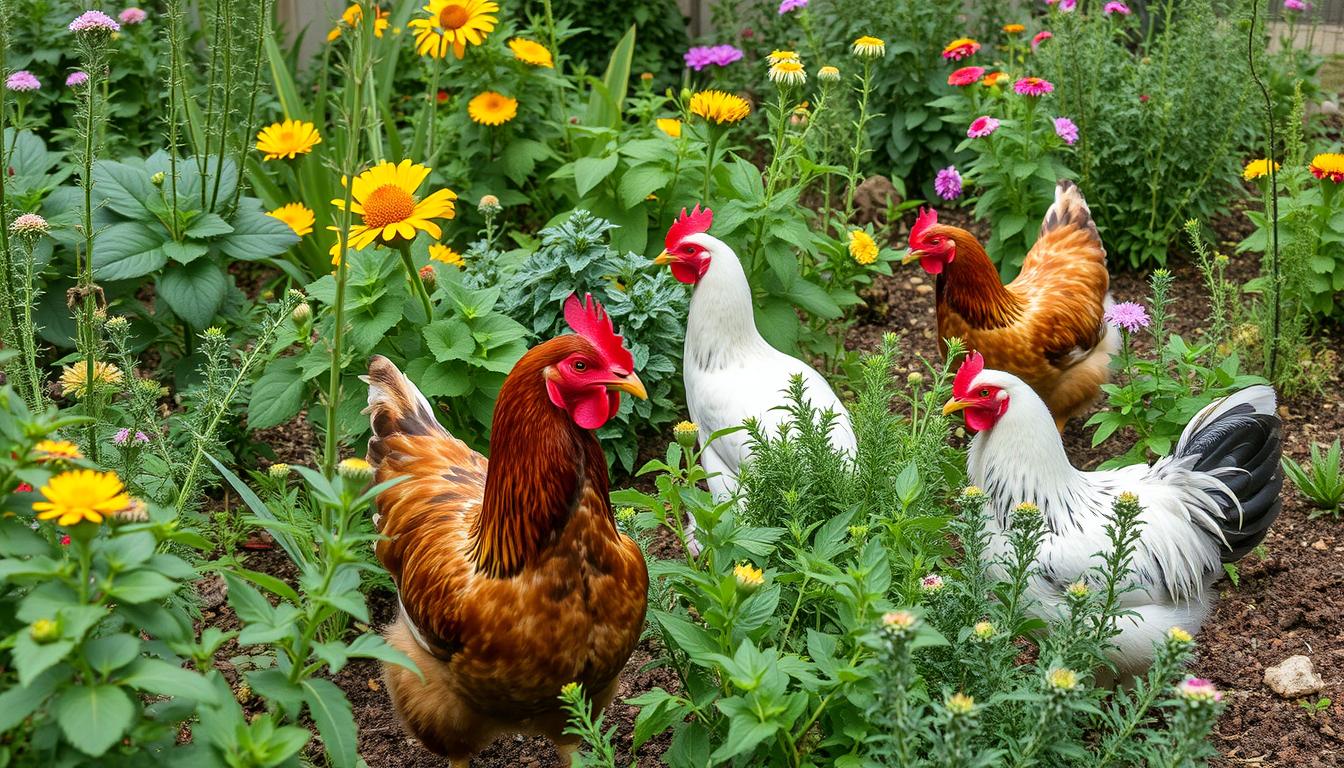Can chickens be the secret to a thriving, self-sustaining permaculture garden? As permaculture practitioners have found, the answer is yes. Chickens can bring many benefits, like natural pest control and fresh eggs. But how do they help keep a permaculture ecosystem balanced?
Key Takeaways:
- Chickens can serve as natural pest control by consuming insects, weeds, and organic matter in the garden.
- Chicken manure is a highly nitrogen-rich fertilizer that can enrich garden soils.
- Providing chickens with a free-range environment can enhance their diet and further aid in pest control.
- Integrating chickens into a permaculture system can create a closed-loop, self-sustaining ecosystem.
- Careful planning and consideration of chicken coop placement, breed selection, and flock management are key to successful integration.
The Benefits of Permaculture
Permaculture is a way to grow food that’s almost self-sustaining. It’s organic and can be used for personal or commercial farming. This method tries to copy nature, reducing waste and boosting production. Adding chickens to your permaculture can bring many benefits, making your land more sustainable and productive.
Incorporating Chickens into Your Permaculture System
Chickens are key in many permaculture projects. They help create a closed-loop system, acting as mobile composters. They also give you fresh eggs regularly. On average, a hen lays an egg every 1-2 days. Some breeds, like the Australorp, can lay over 350 eggs a year.
Feeding your chickens well ensures they lay more eggs. This makes your food source self-sustaining. Chickens also help keep your garden healthy. They eat pests and make the soil better, using their manure as fertilizer. With the right setup, chickens can be the heart of a thriving permaculture system.
“Permaculture is a philosophy of working with, rather than against nature; of protracted and thoughtful observation rather than protracted and thoughtless labor; and of looking at plants and animals in all their functions, rather than treating any area as a single-product system.”
– Bill Mollison, co-founder of permaculture
The Role of Chickens in Permaculture
Chickens are key in permaculture, offering many benefits. They give fresh eggs and act as mobile composters. These birds are essential for a successful permaculture garden.
Fresh Eggs from Happy Hens
People add chickens to their gardens for fresh, nutrient-rich eggs. An adult hen lays eggs every three days. This gives a steady supply of protein.
By giving chickens a varied diet and space, gardeners keep them happy. This makes the eggs taste better.
A Walking, Clucking Composter
Chickens are natural composters. They turn kitchen scraps and garden waste into nutrient-rich compost. As they move around, they mix their droppings into the soil.
This process breaks down organic matter. It makes the soil rich in nutrients. This helps the plants in the garden grow well.
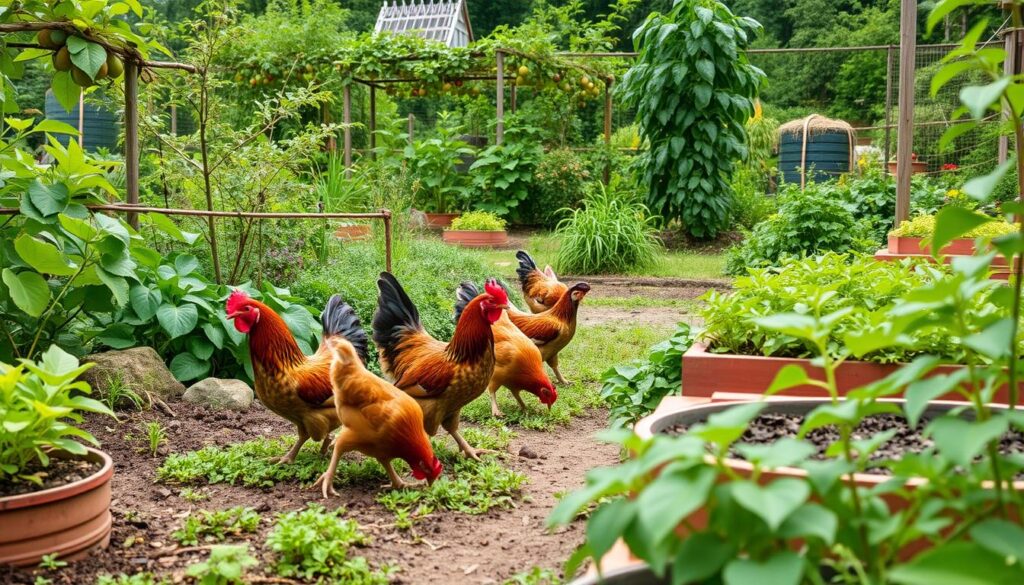
Chickens as Garden Attendants
Chickens are great helpers in a permaculture garden. They work hard and keep pests away. They are good at weeding, tilling soil, and eating insects that harm plants.
As they move around, chickens make the soil better. They break up hard earth, helping water and nutrients get in. They also stop weeds from growing, so your plants can do well.
Chickens do more than just help with weeds. They eat many pests, like insects and slugs. This keeps your garden healthy and strong.
Adding chickens to your garden is good for the environment. They help keep the garden balanced. With their help, your garden can grow strong and healthy.
Socialization and Behavior of Chickens
Chickens are social animals that do best in groups. Knowing their natural behaviors and social structures is key to a healthy flock. They have complex flock dynamics and show various behaviors that help them stay well.
Understanding Flock Dynamics
Chickens are very social and form a pecking order in their group. This order decides who gets to food, water, and nesting spots. Watching chicken behavior and chicken flock dynamics helps you make a good home for happy and healthy chickens.
“Providing your chickens with a stimulating and enriched environment is essential for their well-being and can help minimize aggressive behaviors within the flock.”
Things like space, age, and breed affect a chicken flock’s dynamics. Giving each bird enough room indoors and outdoors, and access to resources, keeps the flock peaceful and stable.
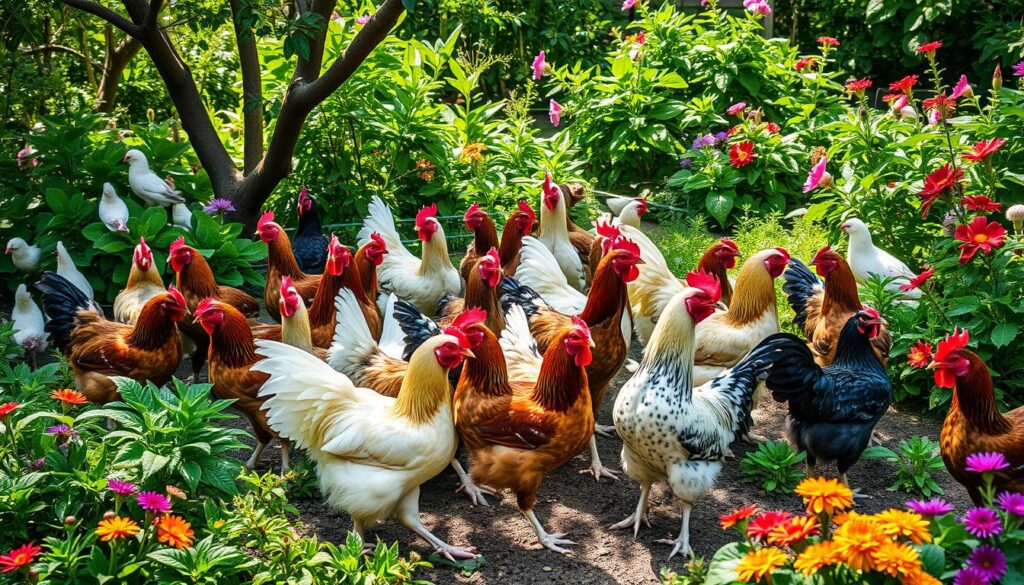
By grasping the details of chicken behavior and chicken flock dynamics, you can build a permaculture system that supports the happy and healthy chickens in your care.
Chickens in Permaculture: Entry and Maintenance
Adding chickens to a permaculture setup needs careful planning. Their coop is their home, offering shelter and safety from predators. A well-designed coop is key to their health.
Setting Up a Chicken Coop
When setting up a chicken coop, think about what your chickens need. They need 3 square feet inside and 3-4 square feet outside for movement. Make sure there’s a nesting box for every 3-5 hens.
The coop must be strong and safe from predators. It should have high roosts and good airflow. A dust bath area helps keep their feathers clean and fights pests.
To keep a chicken environment healthy, clean the coop often. Give them fresh water and a balanced diet. Adding a compost pile or worm bin near the coop helps your garden grow.
Breeding More Chickens
Chickens have been our friends for over 8,000 years. They give us fresh eggs and help in permaculture. If you’re growing your flock, think about breeding more chickens. This way, you can have more of them and enjoy more benefits.
The Hatching Process
The chicken hatching process is amazing and complex. First, hens are bred, and then eggs are incubated. This creates the best setting for chicks to grow.
For 21 days, eggs need careful watching and the right temperature. This ensures they hatch well.
After hatching, chicks start growing fast. They go from fluffy to fully feathered. To help them grow strong, you need to care for them well. Knowing how to breed chickens and watch their chick development is key to a healthy flock.
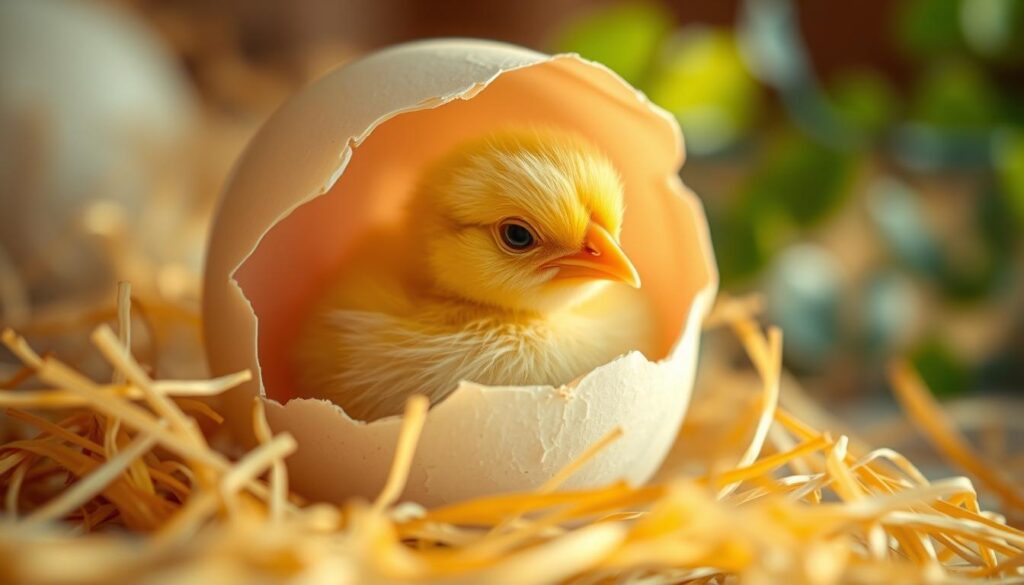
Good incubation and chicken hatching are vital for a growing chicken population. By following the right steps and providing the right conditions, you can hatch new chicks. This helps grow your flock and makes your permaculture system more sustainable.
Chickens for Pest Control in Gardens
Adding chickens to your garden can be a smart move for pest control. These birds love to eat pests like insects, grubs, and weed seeds. They are a big help in keeping your garden pest-free without using harmful chemicals.
Effective Pest Control Methods
Chickens help make your soil better by adding nitrogen-rich manure. They also help break down organic matter faster. This makes your soil healthier and more fertile.
Chickens also eat weeds, which means you don’t have to use herbicides. This saves you time and effort in your garden. It’s a win-win for both you and your garden.
Studies show gardens with chickens need 60% less chemical pesticides. 72% of gardeners see fewer pests thanks to their chickens. Chickens are a natural way to keep pests away.
Chickens not only eat pests but also add nutrients to your compost. This helps your soil even more. Using chickens is a smart way to manage pests and improve your garden’s health.
By using chickens in your garden, you get many benefits. You’ll have fewer pests, better soil, and a more sustainable garden. This organic pest control method is good for your garden and the environment.
Chickens in Permaculture
Adding chickens in permaculture boosts your land’s sustainability and productivity. These birds fit perfectly with permaculture principles. They help create closed-loop systems and foster symbiotic relationships.
Chickens do more than give you fresh eggs. They act as mobile composters. Their manure enriches the soil, reducing waste and closing the loop. This method promotes a balanced ecosystem where resources are used efficiently.
“Chickens are the perfect example of how permaculture can create a self-sustaining, symbiotic system.”
Placing chicken coops and runs in your design helps. Chickens become garden helpers, aerating the soil and eating pests and weeds. This natural pest control avoids harmful chemicals, aligning with permaculture’s natural approach.
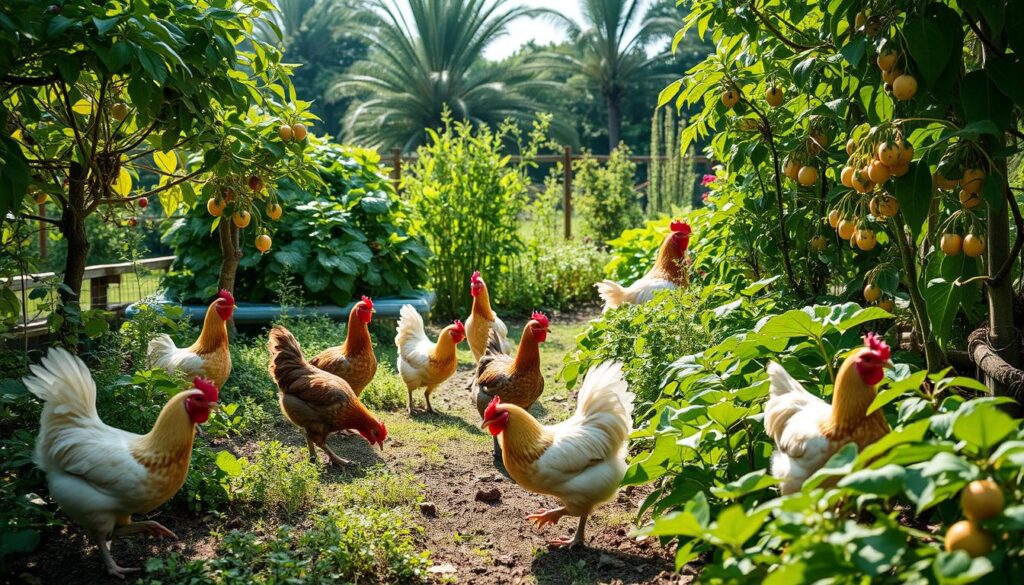
Embracing chickens in permaculture brings many benefits. They help with nutrient cycling and pest management. These birds are key to a self-sustaining system that follows permaculture’s core principles.
Utilizing Chickens in Orchards
Chickens can be a big help in orchards. They help break the pest cycle and make the orchard healthier. By using chickens, you can control pests like insects, grubs, weeds, and small rodents.
Breaking the Pest Cycle
A small flock of 15 chickens can clear a 1,700 square feet area of bugs in just a week. Chickens can debug a fruit tree in an hour. This stops pests and diseases from harming your crops. Chickens eat many pests, including insects, beetles, grubs, weed seeds, squash bugs, Japanese beetles, mosquitoes, ticks, and more.
Chickens can increase apple harvests and make homemade applesauce for years. They also help reduce flies in pastures by eating maggots.
“One chicken can debug up to 120 square feet of land per week, making them a highly effective and natural pest control solution for orchards.”
To use chickens for pest control, you can keep them in tractors or coops. Or let them roam free. You can also keep them near the garden or supervise them in the orchard. Moving chickens around with tractors or netting ensures they cover the whole orchard.
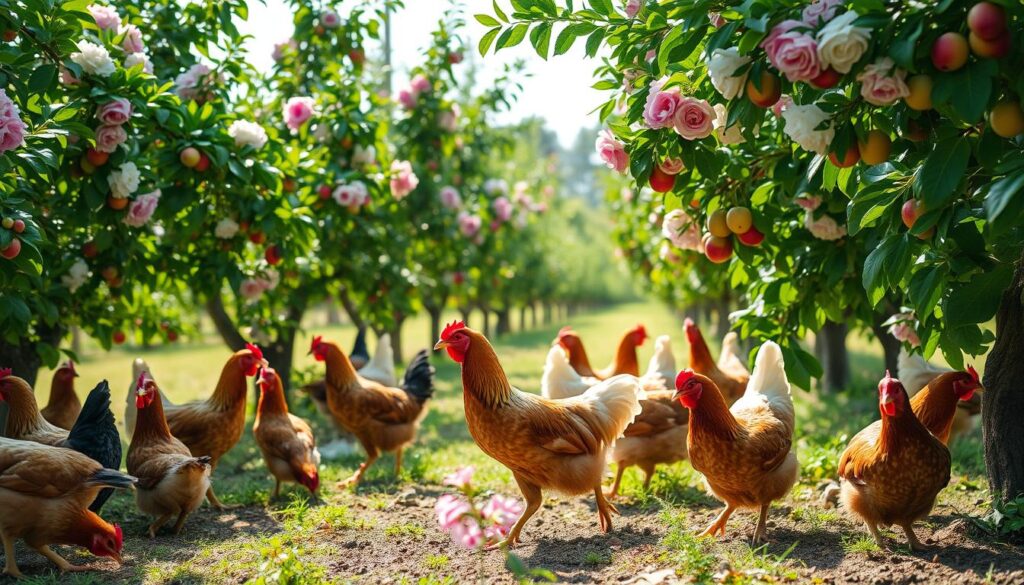
Adding chickens to your orchard is good for both your wallet and the environment. It saves on feed costs and breaks the pest cycle. This leads to healthier trees and more fruit. Chickens are a natural and effective way to manage pests and maintain a sustainable orchard.
Cost-Benefit Analysis of Backyard Chickens
Keeping backyard chickens sounds great, but you need to think it through first. The costs can pile up fast, from the coop to feed and upkeep. Yet, the perks like fresh eggs, pest control, and fertilizer might make it worth it for some.
Choosing the Right Breed
The breed you pick matters a lot. Some, like Rhode Island Reds and Orpingtons, lay lots of eggs. This is good if you want eggs often. Others, like Cornish and Plymouth Rocks, are better for meat. Think about what you want and pick a breed that fits your needs and budget.
Deciding on backyard chickens should be a careful choice. The start-up costs are high, but the long-term benefits are big. Knowing the costs and picking the right breed can help you make a smart choice for your home.
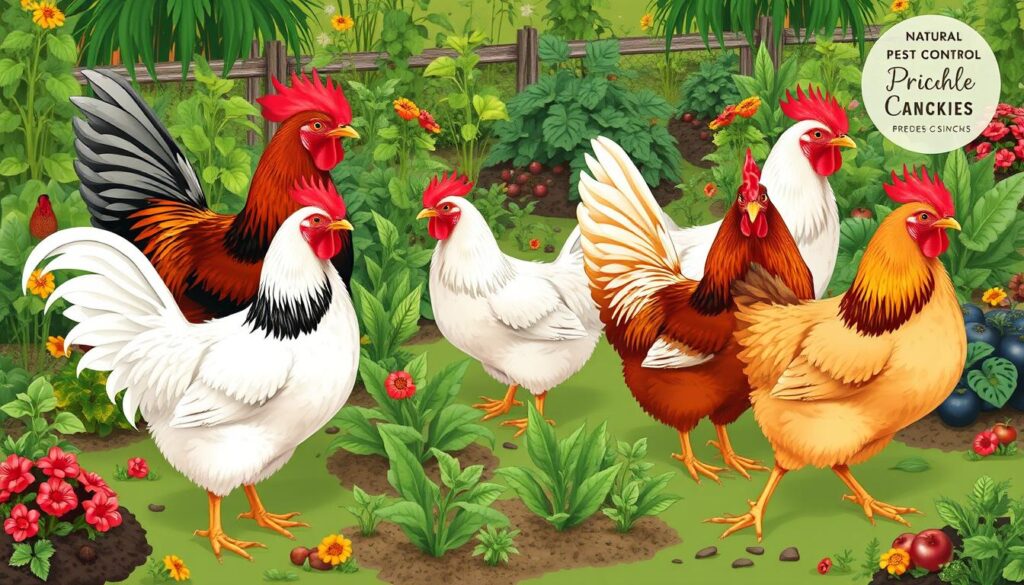
Integrating Chickens into Your Permaculture System
Adding chickens to your permaculture can change the game. They’re great at making eggs and help with composting and pest control. By following permaculture rules, you can make a system that works well and wastes less.
Feeding your chickens a mix of plants is key. This way, they get more nutrients and their eggs are better. Also, using their manure in compost speeds up the process. This makes your soil richer for your plants.
“Chickens are the unsung heroes of the permaculture world, simultaneously improving soil health, controlling pests, and producing a delicious, sustainable source of protein.”
Using a chicken tractor or movable coop is smart. It spreads their droppings around, making your soil better. Also, keeping the right balance in compost helps break down manure. This releases nutrients for your plants.
Learning to use chickens in permaculture is ongoing. By understanding how chickens fit into this system, you can build a self-sustaining place. This place will help you and the environment.
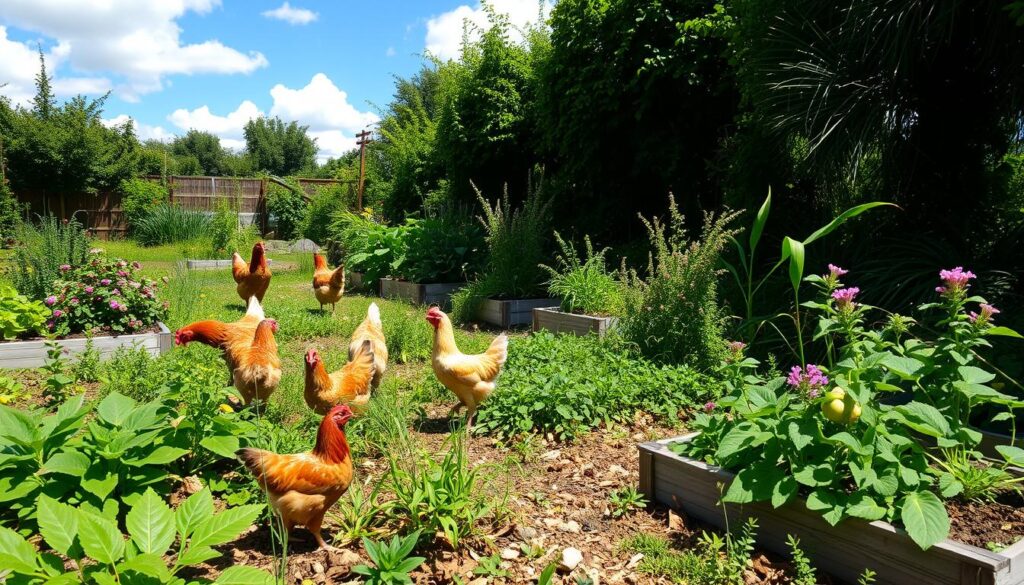
Local Regulations and Considerations
Before you start keeping chickens, it’s key to know the local regulations for backyard chickens and chicken ownership laws in your area. Understanding the legal side of chicken keeping is vital. It helps you follow permitting requirements and keeps peace with your neighbors.
Many cities have rules about keeping backyard chickens. For example, New York City doesn’t allow roosters because of noise. Health departments might also check to make sure chickens don’t pose health risks.
The number of chickens you can have is often limited by local laws. Even in small urban areas, it’s best to keep a flock of at least 3 chickens. Keeping fewer than 8 is usually recommended. Keeping your area clean and managing waste well is crucial to avoid smells and pass health checks.
As a permaculture expert, it’s crucial to follow all local regulations for backyard chickens, chicken ownership laws, and permitting requirements. By doing this, you can smoothly add chickens to your system. This way, you avoid legal and community issues.
Conclusion
Incorporating chickens in permaculture brings many benefits. These include natural pest control, nutrient-rich fertilizer, and a steady egg supply. By understanding their role and following care best practices, you can create a thriving, sustainable, and self-sufficient food system.
The benefits of backyard chickens in permaculture are vast. They naturally control pests and add nutrient-rich manure to the soil. Chickens also bring a unique sensory experience with their vibrant feathers and distinct personalities.
When starting your sustainable agriculture journey, think about adding chickens to your permaculture. The right housing, feed, and environment are key to maximizing their benefits. With planning and dedication, you can enjoy fresh eggs, natural pest control, and a thriving food system.

